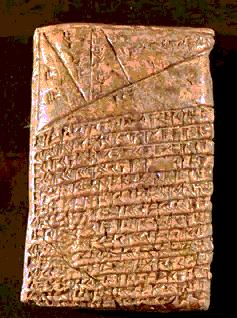A Clay Tablet of Mathematical calculations.
It is possible that the birth place of Mathematics is Babylonia.Their maths wasmainly to do with arithmetic, measurement and geometry. We know alot of their mathematical thinking because records of their system written on clay tablets have been found.

|
The Computer's Story
I thought I’d tell you about a book I was reading yesterday. It is a fun book about computers. It is called ‘The Knowledge – Crashing Computers by Michael Coleman.’
The book is written in a funny way that makes you laugh. It tells of the history of computers and computer games. There are lots of comparisons between a teacher and a computer. Teachers come out on top because they are human and can see jokes and things.
Another chapter tells about how computers have crashed and the resulting madness that followed. It tells the story of the Internet and the World Wide Web.
All in all the sort of book that tells you lots of facts in a way that makes reading a pleasure and learning fun to do. Strange that this helps you remember.
Coleman, who wrote the book, said that a great test of being intelligent is telling jokes. I believe this to be true and that makes us ‘geniuses!’ The reason why is that we understand why something is funny.
Take the joke about Sherlock Holmes and Doctor Watson. They go camping. It is nighttime when their put up their tent.
Hours later Holmes wakes Watson and asks him what can he see and what does it mean. Watson names several stars and says that it means that somewhere in the starry heaven there may be another planet like Earth with life on it.
No says Holmes. Somebody has stolen our tent!
You may have not thought it was very funny but you understood it. A computer would not understand why it is a joke.
We know that if you divide A by B and multiply the answer by B you should get back to A. Try this on your computer calculator:
a. Key in the number 100
b. Divide by 3
c. Multiply by 3
The answer is (100) but the calculator shows 99.999999999999 ! Is this the right answer!
The History of computing began in 1623. A German called ‘Wilhelm Schickard built a ‘calculator clock’
1642 and Blaise Pascal invented the ‘Pascaline.’ Strange calculations happened when adding 1 to 99999!
1673. Gottfried Leibniz built a calculator that could add, subtract, multiply and divide.
1822 Charles Babbage had lots of bright ideas to built a ‘Difference Engine.’ He never completed building it. 1833 Babbage designed a better machine which he calls an ‘Analytical Machine.’ It was so complicated nobody could understand how to make it. Had technology then been as good then as now his machine would have worked? In 1991 Babbages ‘Difference Machine’ was built and it worked!
1886. Herman Hollerith makes a paper program with holes punched in them. 1924 and the company becomes IBM.
1939. John V. Atanasoff builds an electronic calculating machine called ABC.
1940. England. Manchester University starts developing a computing machine called MAD.
1941. England. Tommy Flowers builds a code-breaking calculator called ‘Colossus.’
1943. USA. ENIAC developed at University of Pennsylvania.
1948. England, Manchester University MAD Mk 1 first computer to be programmed. Called ‘Baby.’
1947. Transistors invented.
1967. England. The first ATM used at Barcley’s Bank.
1969.Invention of the silicon chip.
1975. First personal computer the Altair is invented.
1980. The Acorn BBC Microcomputer.
1980’s. England. The Sinclair Spectrum.
1981. IMB introduce the P.C.
1984. Apple Mac
1985. Microsoft Windows introduced for the IBM PC.
That’s an outline of the history of computers. The book tells a much funnier story.
Adults often believe that playing computer games is bad but you could argue that computer games help you to learn to think quickly, improve your attention so that you can stay focused longer. Learn from experience and by using a computer you are learning about new technology. You do not have to convince me. I know this only too well!
.
If you come across this book you’ll have a good read.
The Boss
|


